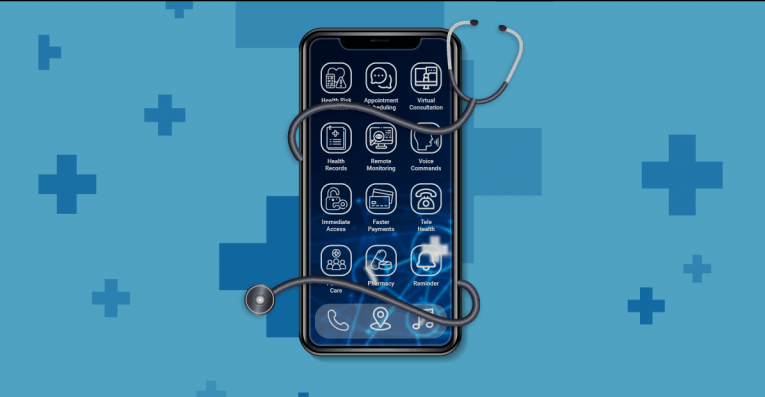Smartphones have evolved from basic communication tools into powerful health monitoring devices. What once started with simple pedometers has now expanded to include heart rate monitoring, SpO2 tracking, ECG readings, and even blood pressure estimation. With AI-driven insights and real-time data processing, modern smartphones enable users to track their health with unprecedented accuracy.
Tech giants like Apple, Samsung, and Google are leading the way, making health tracking a core feature of smartphones and wearables.
How Health Sensors Work in Smartphones
Modern smartphones use advanced sensors to measure various health metrics. These include:
- Optical sensors – Measure heart rate and SpO2 (blood oxygen levels) by analyzing light absorption through the skin.
- Electrodes – Capture ECG readings, helping detect irregular heart rhythms.
- Accelerometers and gyroscopes – Monitor movement, step count, fall detection, and activity tracking.
AI-powered algorithms process this raw health data, transforming it into meaningful insights displayed in apps like Apple Health, Samsung Health, and Google Fit.
Medical Applications and Early Detection
Smartphones are not just for fitness; they are also playing a critical role in medical diagnostics. Key advancements include:
- ECG Monitoring – Features in Apple Watches and Samsung Galaxy Watches help detect conditions like atrial fibrillation, prompting early medical intervention.
- Blood Pressure Estimation – Samsung has integrated blood pressure monitoring, reducing dependency on traditional devices.
- Continuous Glucose Monitoring (CGM) – Emerging smartphone apps for diabetics aim to provide real-time glucose tracking.
- AI-driven Health Predictions – AI-powered analytics can detect potential health risks before symptoms arise.
While these features offer great potential, accuracy depends on sensor placement, movement, and environmental factors, making clinical validation crucial.
Top Smartphone Brands Leading in Health Monitoring
Apple
Apple continues to lead in health innovation, particularly through the Apple Watch. Notable features include:
- ECG monitoring for detecting irregular heart rhythms.
- SpO2 tracking for blood oxygen level monitoring.
- Fall detection – Automatically calls emergency services after a hard fall.
- Seamless integration with Apple Health, providing personalized health insights.
Samsung
Samsung’s Galaxy Watch series has become a major player in digital health tracking, offering:
- Blood pressure estimation – A unique feature not found in many competitors.
- Heart rate variability analysis for stress tracking.
- Samsung Health – A comprehensive platform for activity, sleep, and wellness tracking.
- Medical collaborations – Samsung is working with health institutions to improve accuracy.
Google’s Wear OS ecosystem is expanding with Fitbit-powered health tracking. The Google Pixel Watch includes:
- Advanced heart rate monitoring.
- Sleep tracking and fitness coaching.
- Google Fit integration, offering AI-driven health insights.
- AI applications in healthcare to detect early disease markers.
Other Notable Brands
- Huawei – Known for advanced sleep tracking and SpO2 monitoring.
- Xiaomi – Focuses on affordable health tracking, making it accessible to a broader audience.
- Fitbit (owned by Google) – Offers hydration tracking, stress management, and in-depth fitness insights.
How Accurate Are Smartphone Health Sensors?
While smartphone-based health monitoring is promising, accuracy remains a concern. Clinical validation studies have compared smartphone sensors with medical-grade devices, showing:
- ECG and SpO2 tracking in Apple and Samsung devices provide readings close to medical-grade equipment.
- However, movement, skin tone variations, and sensor placement can impact accuracy.
- Most experts recommend using smartphone health tracking for general monitoring rather than medical diagnosis.
As technology advances, improved algorithms and stricter regulations will enhance data reliability and ensure that smartphones can be used more confidently for health tracking.
Privacy, Security, and Ethical Concerns
With smartphones collecting sensitive health data, privacy and security challenges arise. To ensure data protection:
- Strong encryption and strict data policies must be implemented.
- Regulations like GDPR and HIPAA provide legal protection, but transparency is crucial.
- User consent should be prioritized to prevent unauthorized access to medical information.
The Future of Smartphone Health Monitoring
The next wave of health technology innovations includes:
- Non-invasive glucose monitoring – A game-changer for diabetics.
- Hydration tracking – Smart sensors will monitor hydration levels in real time.
- AI-powered disease prediction – Early detection of conditions like diabetes and heart disease.
- Healthcare system integration – Real-time data sharing with doctors for remote patient monitoring.
READ MORE: ICC Men’s Champions Trophy 2025: Record-Breaking Prize Pool Announced
With continuous advancements, smartphones are set to play a crucial role in preventive healthcare. As Apple, Samsung, Google, and other tech giants push the boundaries, smartphones will become indispensable health companions, helping users take control of their well-being like never before.




